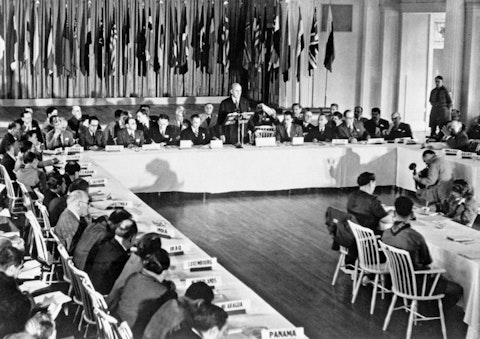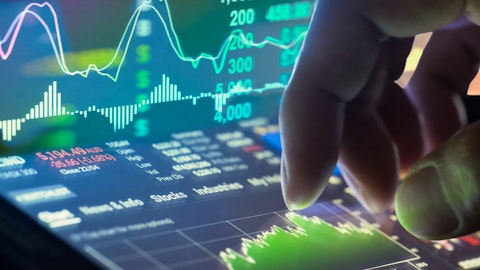In 1944, with the death machine of World War II still very much churning, the Bretton Woods conference saw delegates from 45 nations descend on New Hampshire to devise rules that would govern the post-war international monetary system. Fast-forward to 2020, and another tumultuous global event has led to calls by the IMF for “a new Bretton Woods moment.” This is troubling on many levels.

Bretton Woods Conference, July 1944.
Image source: UN photo
The Significance of Bretton Woods 1.0
First, a brief history lesson. Bretton Woods enshrined the US dollar as the world’s de facto international settlement currency, with dollars convertible to gold at $35 per ounce. Overnight, the dollar became synonymous with world trade, supplanting the gold standard and asserting America’s might on the international stage.
Since the United States was the only country that could physically print dollars, and each country had agreed to redeem its currency for US dollars rather than the precious metal, the US government – or, more accurately, the Federal Reserve – became kingmakers of the global monetary system. The International Monetary Fund, meanwhile, was tasked with enforcing the agreement, ensuring exchange rate stability, and presiding over a fixed pool of currencies which member states could use for borrowing.
Less than three decades after the agreement, and amid rising inflation, President Nixon suspended the USD’s convertibility to gold while firing up the printing machines to finance the Vietnam war. By 1973, the fixed exchange rate system transformed into a floating exchange rate system wherein the value of national currencies fluctuated day-to-day. Nixon, in short, paved the way for the Federal Reserve’s expansive monetary policies. Speaking of which, the Fed’s penchant for deflation-countering quantitative easing has seen its balance sheet explode in 2020, growing by over $3 trillion since February. It’s easy to see a reckoning coming down the road.
What Does Bretton Woods 2020 Look Like?
What exactly is the IMF insinuating by suggesting the time is ripe for a “new Bretton Woods moment”? Written by IMF Managing Director Kristalina Georgieva, the article that appeared in mid-October referenced a pandemic that has “made the world economy 4.4% smaller this year and (will) strip an estimated $11 trillion of output by next year.”
Although Georgieva did not mention the US dollar, she did stress the need to “take measures to prevent the build-up of financial risks over the medium term,” concluding the article with “This is our moment!”
One interpretation of seizing the moment might be an end to the Dollar’s dominance, to be replaced by a more stable international reserve currency. The IMF’s own Special Drawing Rights (SDR) perhaps. Created in 1969, just two years before Nixon abandoned the gold standard, the SDR’s value was originally linked to gold before decoupling and deriving value from a basket of the world’s top global fiat currencies. At present, these include the dollar, euro, Chinese renminbi, Japanese yen, and British pound sterling.
Designed to augment member states’ official reserves, the SDR is known as a “supplementary international reserve asset” and the most obvious candidate for replacing USD in the world stage. Although the IMF is not in the position to create money out of thin air like the Federal Reserve, that mightn’t always be the case. If SDR were to depose the USD, the IMF would in essence become the world’s central bank. From its new eyrie, it would not be surprising to hear IMF brass like Georgieva talk up the protections offered by the basket-backed currency, particularly given the volatility inherent in forex markets.
But the idea of Bretton Woods 2.0 doesn’t inspire a lot of confidence. The Federal Reserve pursued debt and inflation-driven policies for decades, injecting stimulus, dispensing bailout cash as it saw fit, and savagely devaluing the dollar. Incredibly, US debt is expected to reach $28.7 trillion by 20209. An IMF central bank would almost certainly continue pumping magical money into the economy, with a very small and influential cabal regulating fiscal decisions affecting billions of people.
The Revolution Will Be Decentralized
There are better ways. One is represented by Bitcoin, a decentralized, deflationary cryptocurrency that has a fixed, predictable supply that cannot be manipulated by any centralized authority. Another is Sögur (SGR), a blockchain-based digital equivalent of the IMF’s Special Drawing Rights.
Built by a team of tech and finance experts, and supported by an advisory council that includes renowned economists like Dr. Jacob A. Frenkel, Chairman of JPMorgan Chase International, and Leo Melamed, ex-Chairman of the CME, Sögur’s Digital SDR is arguably a superior version of the IMF’s basket-backed currency. Principally because its governance mechanism makes it entirely decentralized: ruled not by a small and ideologically biased group but by token-holders themselves.
By leveraging smart contracts, Sögur automatically increases the price of SGR as its market cap grows. What’s more, funds received when issuing new SGR are held in a reserve and used to ensure the token is always redeemable – like the USD was before Nixon delinked it from gold. SGR is not unique in being an asset-backed cryptocurrency, incidentally; there are others backed by gold or pegged to the US dollar or euro.
What makes SGR unique is the total package: democratic governance, a stable monetary model, fiat redeemability, a deeply knowledgeable and dedicated team, and the transparency and immutability of blockchain technology. Sögur’s parent company, Sogur Monetary Technologies Ltd (SMTL), works under not-for-profit principles, with no shares or shareholders and all parties committed to implementing the protocol and furthering the interests of SGR token-holders.
The IMF is right about one thing – a watershed moment like Bretton Wood is long overdue. But when the USD is finally replaced as the world’s reserve currency, its replacement shouldn’t be built on a mountain of debt. In every respect, a democratically governed digital currency is better equipped to fill the void than another fiat reserve tightly controlled by Keynesian apparatchiks.
Suggested Reading:
- 25 Countries with the most debt per capita and debt to GDP: 2020 Rankings
- 10 Best Growth Stocks To Buy Now According To Ray Dalio
- 10 Best Dividend Stocks for Passive Income
Disclosure: This Op-Ed is written by Reuben Jackson. Insider Monkey News Department isn’t involved in the production of this article.





